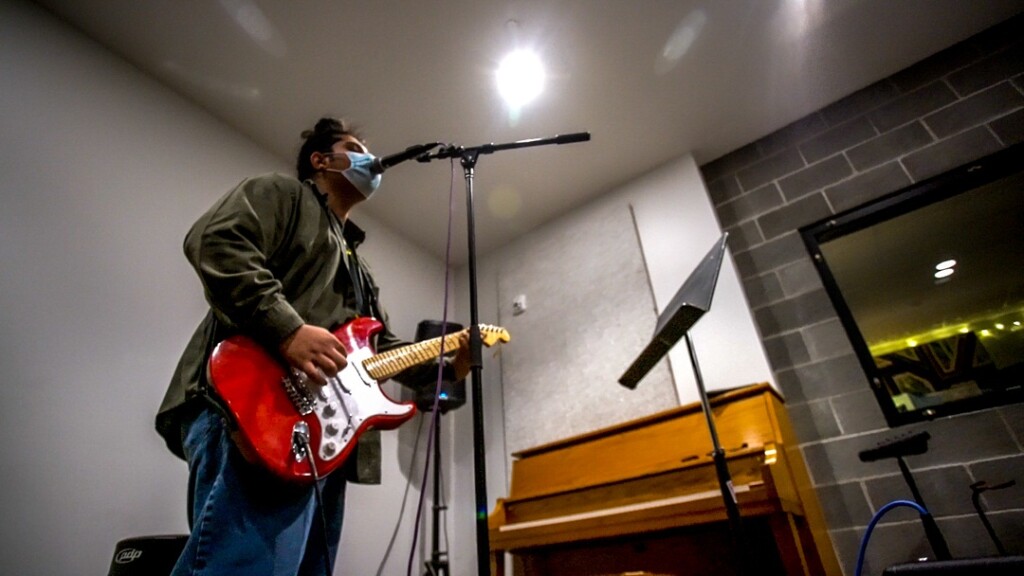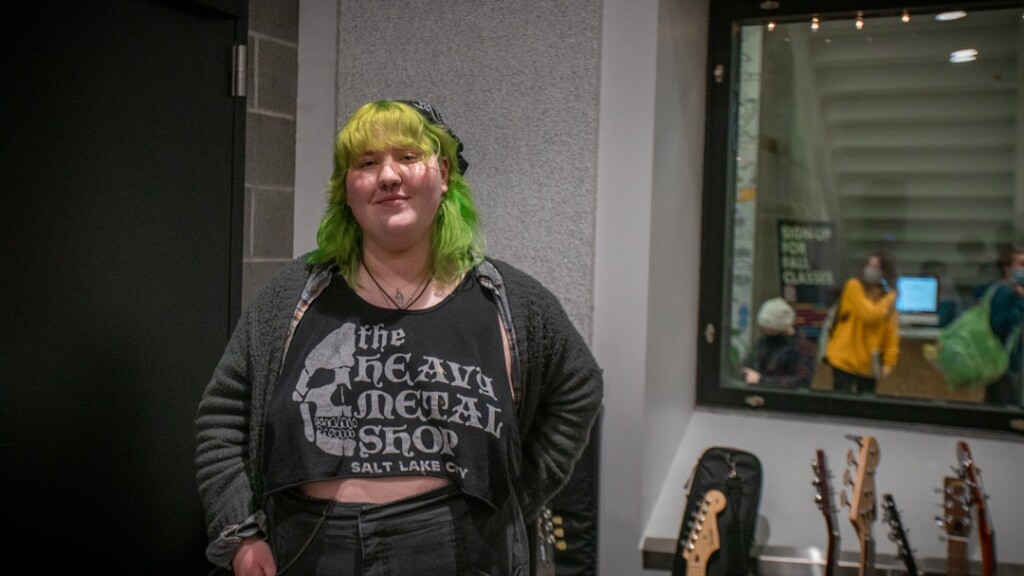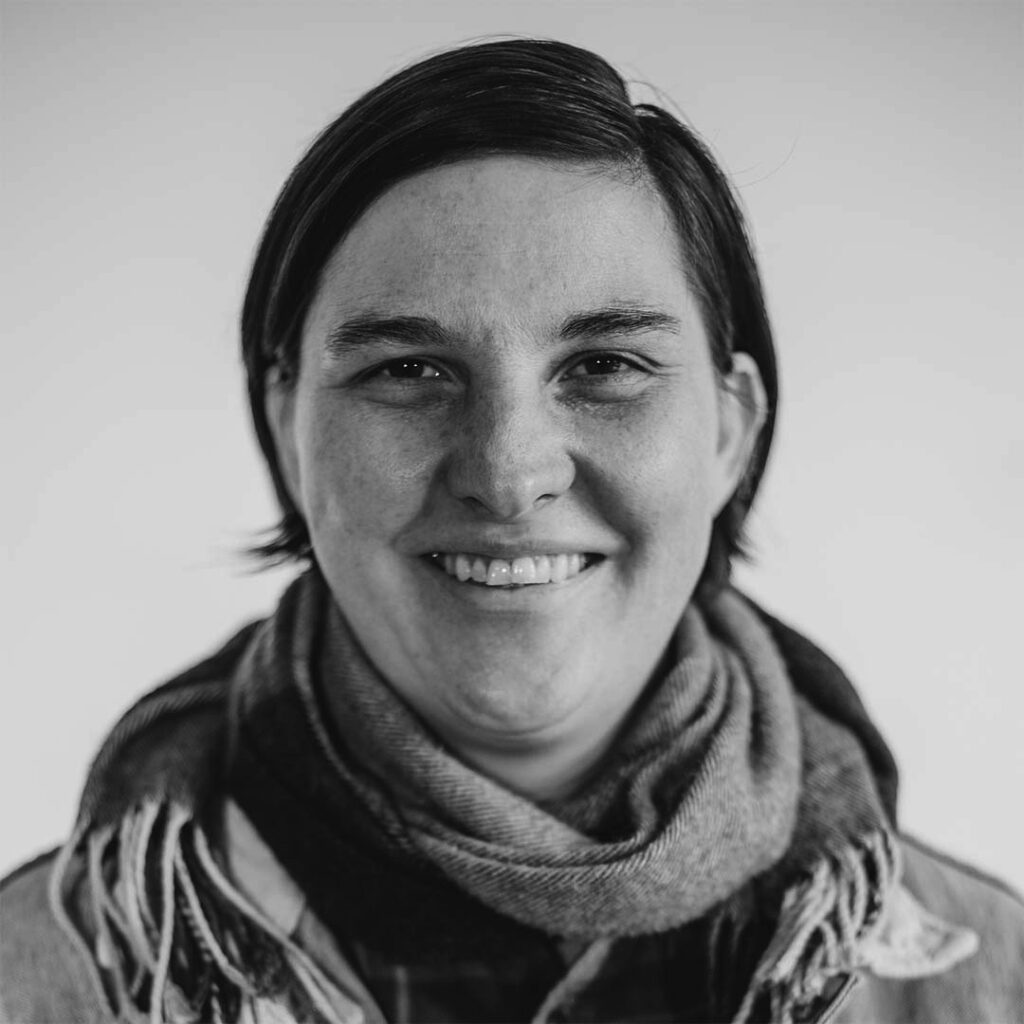Y’all just better be just turnin’ back if you want this boy to win
‘Cos practice is the only cure for the predicament he’s in
Now devil, it would be a sin for you to get my bow
You go on back to hell and to the woodshed I will go
Johnny, are you practicing or will your hands grow cold?
The devil walks the land and plays a fiddle made of gold
The Charlie Daniels Band, The Devil Comes Back to Georgia
Music students know and often dread woodshedding — the word for focused practice in surroundings where there are no distractions. Even for the most naturally talented musician, woodshedding is the key to leveraging the most out of one’s talent.
In its musicology program, Spy Hop Productions takes the art of woodshedding up a step by offering a free four-month-long workshop for aspiring teen songwriters to explore and hone their craft. Led by local musician Cathy Foy, the workshop becomes a peer community for students from different backgrounds and musical interests to offer mutual encouragement. The fall class will culminate Monday, Dec. 13, with the six students performing their songs at the family-friendly venue of Killy Court. Doors open at 6 p.m. and music starts at 7 p.m. The event is free and open to the public.
The current group of students represent quite an assortment of musical backgrounds and philosophies about musical education. This is consistent with one of Spy Hop’s hallmark strengths in its nationally recognized media and arts programs — forming instant communities by breaking every imaginable barrier where the creative environment is nourished so that every participant gains the confidence to sharpen and hone their craft with lots of practice. Kate Randall has taken voice lessons and enjoys playing the ukulele. Lauren Clark also has taken voice lessons and plays the ukulele, an inspirational nod toward 17-year-old singer and songwriter Grace VanderWaal who is well known for pushing the visibility of this stringed instrument. Clark also enjoys performing in musical theater productions. Her sibling Joanne Clark has played trombone in marching and jazz bands, sings in choir and has picked up piano through music theory. Vix Holder has taken singing lessons for a couple of years and has been playing drums for three years. She played in jazz and concert bands in middle school and her father, whom she considers a huge influence, taught her guitar.
The others are mainly self taught. Gavin Palmer taught himself to play guitar and is now taking classical and jazz guitar classes at a local performing arts school. Lucy Quinn started violin in fourth grade but was disenchanted with traditional music pedagogy. Her dad then taught her to play guitar. Nando (who prefers to go by his first name) is mainly self taught and enjoys playing the electric guitar in the classic rock style. His mother had encouraged him in his younger days to take up music, given that his uncle had played bongos for a studio album recording by the Mexican-American band Santana.
The one aspect that binds the students together artistically is their collective dedication to composing lyrics and songs that emanate from a pristine, raw attitude and genuine emotional perspective. There is a remarkable absence of restraint in terms of the candor embedded in the lyrics. The thematic impulses of the songs come through marvelously against a concise, minimalist musical structure. While students can use any genre or style as their muse, the preferred range at least in this current group of young songwriters tends toward ballads and power ballads with incisive lyrics that mark a group of creative minds with surprisingly old soul perspectives. The Woodshedding workshop is truly a laboratory for extending the art of the song.
Lauren Clark’s Jealous Tears is an infectious plaintive ballad about nostalgia and the temptation to recapture it during the complicated transition to adulthood. Randall’s River of Emotions also has that anchoring effect of processing heartfelt experiences. The VanderWaal impact has definitely opened up the range for young songwriters to realize that their perspectives matter just as much as veteran bards and lyricists.
Quinn’s song titled Untitled immediately commands the acknowledgment of a well-developed sociological perspective. She sings about the emergence and empowerment of her identity of feminism, which had been squashed down and discouraged by older male relatives in the Mormon socioreligious culture. The lyrics push aside the imagery of the body as a vessel to be controlled and liberates it as a home of one’s own making. Incidentally, Quinn says she started writing songs in third grade.
“Music is a far more emotional art, even more so than when you are just listening to it,” she says, adding that the space created in Woodshedding has given her “an extra bit of validation.” Quinn’s song follows an elegantly simple structure with instrumental breaks that give the listener just enough of a moment to absorb the meaning of one section before she starts singing the next. She starts off quietly with a G major chord. Only at the end of the song does one recognize how potent the seemingly understated feel of the lyrics strike with transforming clarity. A guide that Quinn turns to is Jeff Tweedy’s 2020 book How To Write One Song: Loving the Things We Create and How They Love Us Back. In particular, Quinn is emboldened by one of Tweedy’s major takeaways in the book about not fearing failure, as he describes it: “I came to the conclusion that no one’s judgment—theirs or mine—would ever hurt for very long, provided I could bring myself back to listening and loving. And looking out for the next song.”
Nando’s song Virtues also springs from a personal challenge by using the art of songwriting as a way of solving a crisis problem and comprehending the experience of a father who gives into substance abuse. Unlike most of his peers who enjoy acoustic instruments, Nando accompanies his song with electric guitar and effects such as a fuzz pedal, not unlike greats such as Kurt Cobain and Jimi Hendrix.
This is the second Woodshedding experience for Nando, who says he signed up the first time to learn how to play and sing at the same time. “I learned about Spy Hop at an assembly in school and I was moved by it,” he adds. His second workshop experience has allowed him to expand the possibilities of the songwriting process. He’ll return to the Woodshedding workshop in January, this time as a peer mentor assisting Foy as they welcome a new group of songwriters.
Nando says the experience has motivated him to explore Spy Hop’s musicology classes, especially as he is interested in mastering remixing and audio engineering skills for studio production.
Foy says the group experiences and how individuals share with each other have “established the sense of community,” which is integral to all of Spy Hop’s programs. She adds that not having prerequisites in terms of music or songwriting experience welcomes naturally talented and self-taught students into the mix. “Some are more rebellious while some have more of the traditional experiences,” she explains. “Everyone faces the same two questions: Why do you want to write a song? What do you want your song to say?” Indeed, writer’s block or the convenient excuse of waiting for the right moment of inspiration do not apply in this type of experience. It appears that the students already know what they need to do to avoid the predicament mentioned in the lyrics of that famous Charlie Daniels Band song.
For more information about this workshop and other programs, see the Spy Hop website.



